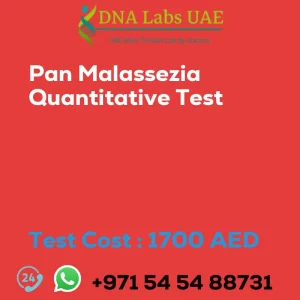Epstein-Barr Virus EBV Viral Load Quantitative Test
At DNA Labs UAE, we offer the Epstein-Barr Virus (EBV) Viral Load Quantitative Test for AED 1700.0. This laboratory test measures the amount of EBV DNA in a person’s blood. EBV is a common virus that is associated with various diseases, including infectious mononucleosis and certain types of cancer.
Test Details
The EBV viral load quantitative test is typically ordered when a healthcare provider suspects an active EBV infection or wants to monitor the progression of a known EBV infection. It can help determine the severity of the infection, guide treatment decisions, and monitor the effectiveness of antiviral therapy.
During the test, a blood sample is collected from the patient and sent to our laboratory for analysis. We use a technique called Real Time PCR to amplify and detect the EBV DNA in the sample. The result is reported as a numerical value, known as the viral load, which represents the number of EBV DNA copies per milliliter of blood.
A high viral load may indicate an active EBV infection, while a low viral load may suggest a previous infection or a dormant virus. However, it is important to note that the viral load alone does not provide a definitive diagnosis of an EBV-related disease. The test results should be interpreted in conjunction with the patient’s clinical symptoms and other laboratory findings.
Components and Price
Test Name: Epstein-Barr Virus EBV Viral Load Quantitative Test
Components: Serum, Whole blood, Plasma, Pleural fluid
Price: AED 1700.0
Report Delivery
Report delivery takes place on the 3rd working day via email (within 36 hours) or phone (within 24 hours).
Test Type and Doctor
Test Type: Viral
Doctor: Physician
Test Department
Test Department: Genetics
Pre Test Information
Prior to the test, patients are required to sign a consent document and bring any clinical history related to Epstein-Barr virus (EBV) infection.
Please note that the EBV viral load quantitative test is primarily used in specialized laboratories and is typically not available in routine clinical settings. It is mainly used for research purposes or in certain cases where a more precise measurement of the viral load is required.
| Test Name | Epstein-Barr virus EBV Viral Load Quantitative Test |
|---|---|
| Components | |
| Price | 1700.0 AED |
| Sample Condition | Serum, Whole blood, Plasma Plural fluid. |
| Report Delivery | 3rd Working Day Email:-36 hours. On phone: 24 hours |
| Method | Real Time PCR |
| Test type | Viral |
| Doctor | Physician |
| Test Department: | Genetics |
| Pre Test Information | Need to sign Consent document and bring any clinical history of patient forEpstein-Barr virus (EBV) Viral Load QuantitativeTest |
| Test Details |
The Epstein-Barr virus (EBV) viral load quantitative test is a laboratory test that measures the amount of EBV DNA in a person’s blood. EBV is a common virus that infects most people at some point in their lives and is associated with various diseases, including infectious mononucleosis and certain types of cancer. The test is typically ordered when a healthcare provider suspects an active EBV infection or wants to monitor the progression of a known EBV infection. It can help determine the severity of the infection, guide treatment decisions, and monitor the effectiveness of antiviral therapy. During the test, a blood sample is collected from the patient and sent to a laboratory for analysis. The lab uses a technique called polymerase chain reaction (PCR) to amplify and detect the EBV DNA in the sample. The result is reported as a numerical value, known as the viral load, which represents the number of EBV DNA copies per milliliter of blood. A high viral load may indicate an active EBV infection, while a low viral load may suggest a previous infection or a dormant virus. However, it is important to note that the viral load alone does not provide a definitive diagnosis of an EBV-related disease. The test results should be interpreted in conjunction with the patient’s clinical symptoms and other laboratory findings. The EBV viral load quantitative test is primarily used in specialized laboratories and is typically not available in routine clinical settings. It is mainly used for research purposes or in certain cases where a more precise measurement of the viral load is required. |








